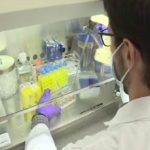Scientists are claiming “extraordinary” success with engineering immune cells to target a specific type of blood cancer in their first clinical trials.
The treatment takes out T-cells from the patients’ bodies, sticks them with molecules that are known to target cancer, and infuses them back into their bodies.
The molecules, which are antigen receptors, then work to limit the ability of cancer cells to ward off the body’s natural immune system.
If you can get T-cells to become part of the immunological memory, the chances of a leukaemia or a cancer relapse becomes much less.
“If you can get T-cells to become part of the immunological memory, the chances of a leukaemia or a cancer relapse becomes much less because once the cancer pops its head up again, immune cells are still there in the background, getting ready to recognise and kill off any small number of cancer cells that have relapsed,” said Martin Pule, a senior lecturer in Haematology, UCL Institute.
A one-year-old Layla received the treatment at London’s Great Ormond Street Hospital (GOSH) in November last year. Doctors had thought the baby was almost certain to die, but she was cancer-free after getting the therapy.
“It was scary, it was terrifying for all of us and we made that decision for her, and it happened to be the best decision we could ever make,” said Lisa Foley, Layla’s mother.
This therapy does not work for all. Researchers say the procedure produces dangerous side effects and in fact, some patients who received the treatment had to go into intensive care after experiencing a serious reaction.
“It’s important to sound a note of caution here. This is a very small study. These treatments don’t work for all types of cancers, and they can have very severe side-effects,” said Cat Arney, a spokesperson to UK’s Cancer Research Institute.
But medical officials are hopeful the treatment could prove a viable option for certain types of cancers. Meanwhile, the treatment could be rolled out to a larger number of patients over time.
“We have the understanding now to redirect and engineer the immune system. As we become more proficient and efficient in doing that, I see it extending out to larger groups of patients,” said professor Waseem Qasim from Great Ormond Street Hospital.
T-cell therapy is often considered an option of last resort because reprogramming the immune system can come with dangerous side-effects, including cytokine release syndrome and overload defense cells.
Scientists are claiming “extraordinary” success with engineering immune cells to target a specific type of blood cancer in their first clinical trials.
The treatment takes out T-cells from the patients’ bodies, sticks them with molecules that are known to target cancer, and infuses them back into their bodies.
The molecules, which are antigen receptors, then work to limit the ability of cancer cells to ward off the body’s natural immune system.
If you can get T-cells to become part of the immunological memory, the chances of a leukaemia or a cancer relapse becomes much less.
“If you can get T-cells to become part of the immunological memory, the chances of a leukaemia or a cancer relapse becomes much less because once the cancer pops its head up again, immune cells are still there in the background, getting ready to recognise and kill off any small number of cancer cells that have relapsed,” said Martin Pule, a senior lecturer in Haematology, UCL Institute.
A one-year-old Layla received the treatment at London’s Great Ormond Street Hospital (GOSH) in November last year. Doctors had thought the baby was almost certain to die, but she was cancer-free after getting the therapy.
“It was scary, it was terrifying for all of us and we made that decision for her, and it happened to be the best decision we could ever make,” said Lisa Foley, Layla’s mother.
This therapy does not work for all. Researchers say the procedure produces dangerous side effects and in fact, some patients who received the treatment had to go into intensive care after experiencing a serious reaction.
“It’s important to sound a note of caution here. This is a very small study. These treatments don’t work for all types of cancers, and they can have very severe side-effects,” said Cat Arney, a spokesperson to UK’s Cancer Research Institute.
But medical officials are hopeful the treatment could prove a viable option for certain types of cancers. Meanwhile, the treatment could be rolled out to a larger number of patients over time.
“We have the understanding now to redirect and engineer the immune system. As we become more proficient and efficient in doing that, I see it extending out to larger groups of patients,” said professor Waseem Qasim from Great Ormond Street Hospital.
T-cell therapy is often considered an option of last resort because reprogramming the immune system can come with dangerous side-effects, including cytokine release syndrome and overload defense cells.
Scientists are claiming “extraordinary” success with engineering immune cells to target a specific type of blood cancer in their first clinical trials.
The treatment takes out T-cells from the patients’ bodies, sticks them with molecules that are known to target cancer, and infuses them back into their bodies.
The molecules, which are antigen receptors, then work to limit the ability of cancer cells to ward off the body’s natural immune system.
If you can get T-cells to become part of the immunological memory, the chances of a leukaemia or a cancer relapse becomes much less.
“If you can get T-cells to become part of the immunological memory, the chances of a leukaemia or a cancer relapse becomes much less because once the cancer pops its head up again, immune cells are still there in the background, getting ready to recognise and kill off any small number of cancer cells that have relapsed,” said Martin Pule, a senior lecturer in Haematology, UCL Institute.
A one-year-old Layla received the treatment at London’s Great Ormond Street Hospital (GOSH) in November last year. Doctors had thought the baby was almost certain to die, but she was cancer-free after getting the therapy.
“It was scary, it was terrifying for all of us and we made that decision for her, and it happened to be the best decision we could ever make,” said Lisa Foley, Layla’s mother.
This therapy does not work for all. Researchers say the procedure produces dangerous side effects and in fact, some patients who received the treatment had to go into intensive care after experiencing a serious reaction.
“It’s important to sound a note of caution here. This is a very small study. These treatments don’t work for all types of cancers, and they can have very severe side-effects,” said Cat Arney, a spokesperson to UK’s Cancer Research Institute.
But medical officials are hopeful the treatment could prove a viable option for certain types of cancers. Meanwhile, the treatment could be rolled out to a larger number of patients over time.
“We have the understanding now to redirect and engineer the immune system. As we become more proficient and efficient in doing that, I see it extending out to larger groups of patients,” said professor Waseem Qasim from Great Ormond Street Hospital.
T-cell therapy is often considered an option of last resort because reprogramming the immune system can come with dangerous side-effects, including cytokine release syndrome and overload defense cells.
Scientists are claiming “extraordinary” success with engineering immune cells to target a specific type of blood cancer in their first clinical trials.
The treatment takes out T-cells from the patients’ bodies, sticks them with molecules that are known to target cancer, and infuses them back into their bodies.
The molecules, which are antigen receptors, then work to limit the ability of cancer cells to ward off the body’s natural immune system.
If you can get T-cells to become part of the immunological memory, the chances of a leukaemia or a cancer relapse becomes much less.
“If you can get T-cells to become part of the immunological memory, the chances of a leukaemia or a cancer relapse becomes much less because once the cancer pops its head up again, immune cells are still there in the background, getting ready to recognise and kill off any small number of cancer cells that have relapsed,” said Martin Pule, a senior lecturer in Haematology, UCL Institute.
A one-year-old Layla received the treatment at London’s Great Ormond Street Hospital (GOSH) in November last year. Doctors had thought the baby was almost certain to die, but she was cancer-free after getting the therapy.
“It was scary, it was terrifying for all of us and we made that decision for her, and it happened to be the best decision we could ever make,” said Lisa Foley, Layla’s mother.
This therapy does not work for all. Researchers say the procedure produces dangerous side effects and in fact, some patients who received the treatment had to go into intensive care after experiencing a serious reaction.
“It’s important to sound a note of caution here. This is a very small study. These treatments don’t work for all types of cancers, and they can have very severe side-effects,” said Cat Arney, a spokesperson to UK’s Cancer Research Institute.
But medical officials are hopeful the treatment could prove a viable option for certain types of cancers. Meanwhile, the treatment could be rolled out to a larger number of patients over time.
“We have the understanding now to redirect and engineer the immune system. As we become more proficient and efficient in doing that, I see it extending out to larger groups of patients,” said professor Waseem Qasim from Great Ormond Street Hospital.
T-cell therapy is often considered an option of last resort because reprogramming the immune system can come with dangerous side-effects, including cytokine release syndrome and overload defense cells.
Scientists are claiming “extraordinary” success with engineering immune cells to target a specific type of blood cancer in their first clinical trials.
The treatment takes out T-cells from the patients’ bodies, sticks them with molecules that are known to target cancer, and infuses them back into their bodies.
The molecules, which are antigen receptors, then work to limit the ability of cancer cells to ward off the body’s natural immune system.
If you can get T-cells to become part of the immunological memory, the chances of a leukaemia or a cancer relapse becomes much less.
“If you can get T-cells to become part of the immunological memory, the chances of a leukaemia or a cancer relapse becomes much less because once the cancer pops its head up again, immune cells are still there in the background, getting ready to recognise and kill off any small number of cancer cells that have relapsed,” said Martin Pule, a senior lecturer in Haematology, UCL Institute.
A one-year-old Layla received the treatment at London’s Great Ormond Street Hospital (GOSH) in November last year. Doctors had thought the baby was almost certain to die, but she was cancer-free after getting the therapy.
“It was scary, it was terrifying for all of us and we made that decision for her, and it happened to be the best decision we could ever make,” said Lisa Foley, Layla’s mother.
This therapy does not work for all. Researchers say the procedure produces dangerous side effects and in fact, some patients who received the treatment had to go into intensive care after experiencing a serious reaction.
“It’s important to sound a note of caution here. This is a very small study. These treatments don’t work for all types of cancers, and they can have very severe side-effects,” said Cat Arney, a spokesperson to UK’s Cancer Research Institute.
But medical officials are hopeful the treatment could prove a viable option for certain types of cancers. Meanwhile, the treatment could be rolled out to a larger number of patients over time.
“We have the understanding now to redirect and engineer the immune system. As we become more proficient and efficient in doing that, I see it extending out to larger groups of patients,” said professor Waseem Qasim from Great Ormond Street Hospital.
T-cell therapy is often considered an option of last resort because reprogramming the immune system can come with dangerous side-effects, including cytokine release syndrome and overload defense cells.
Scientists are claiming “extraordinary” success with engineering immune cells to target a specific type of blood cancer in their first clinical trials.
The treatment takes out T-cells from the patients’ bodies, sticks them with molecules that are known to target cancer, and infuses them back into their bodies.
The molecules, which are antigen receptors, then work to limit the ability of cancer cells to ward off the body’s natural immune system.
If you can get T-cells to become part of the immunological memory, the chances of a leukaemia or a cancer relapse becomes much less.
“If you can get T-cells to become part of the immunological memory, the chances of a leukaemia or a cancer relapse becomes much less because once the cancer pops its head up again, immune cells are still there in the background, getting ready to recognise and kill off any small number of cancer cells that have relapsed,” said Martin Pule, a senior lecturer in Haematology, UCL Institute.
A one-year-old Layla received the treatment at London’s Great Ormond Street Hospital (GOSH) in November last year. Doctors had thought the baby was almost certain to die, but she was cancer-free after getting the therapy.
“It was scary, it was terrifying for all of us and we made that decision for her, and it happened to be the best decision we could ever make,” said Lisa Foley, Layla’s mother.
This therapy does not work for all. Researchers say the procedure produces dangerous side effects and in fact, some patients who received the treatment had to go into intensive care after experiencing a serious reaction.
“It’s important to sound a note of caution here. This is a very small study. These treatments don’t work for all types of cancers, and they can have very severe side-effects,” said Cat Arney, a spokesperson to UK’s Cancer Research Institute.
But medical officials are hopeful the treatment could prove a viable option for certain types of cancers. Meanwhile, the treatment could be rolled out to a larger number of patients over time.
“We have the understanding now to redirect and engineer the immune system. As we become more proficient and efficient in doing that, I see it extending out to larger groups of patients,” said professor Waseem Qasim from Great Ormond Street Hospital.
T-cell therapy is often considered an option of last resort because reprogramming the immune system can come with dangerous side-effects, including cytokine release syndrome and overload defense cells.
Scientists are claiming “extraordinary” success with engineering immune cells to target a specific type of blood cancer in their first clinical trials.
The treatment takes out T-cells from the patients’ bodies, sticks them with molecules that are known to target cancer, and infuses them back into their bodies.
The molecules, which are antigen receptors, then work to limit the ability of cancer cells to ward off the body’s natural immune system.
If you can get T-cells to become part of the immunological memory, the chances of a leukaemia or a cancer relapse becomes much less.
“If you can get T-cells to become part of the immunological memory, the chances of a leukaemia or a cancer relapse becomes much less because once the cancer pops its head up again, immune cells are still there in the background, getting ready to recognise and kill off any small number of cancer cells that have relapsed,” said Martin Pule, a senior lecturer in Haematology, UCL Institute.
A one-year-old Layla received the treatment at London’s Great Ormond Street Hospital (GOSH) in November last year. Doctors had thought the baby was almost certain to die, but she was cancer-free after getting the therapy.
“It was scary, it was terrifying for all of us and we made that decision for her, and it happened to be the best decision we could ever make,” said Lisa Foley, Layla’s mother.
This therapy does not work for all. Researchers say the procedure produces dangerous side effects and in fact, some patients who received the treatment had to go into intensive care after experiencing a serious reaction.
“It’s important to sound a note of caution here. This is a very small study. These treatments don’t work for all types of cancers, and they can have very severe side-effects,” said Cat Arney, a spokesperson to UK’s Cancer Research Institute.
But medical officials are hopeful the treatment could prove a viable option for certain types of cancers. Meanwhile, the treatment could be rolled out to a larger number of patients over time.
“We have the understanding now to redirect and engineer the immune system. As we become more proficient and efficient in doing that, I see it extending out to larger groups of patients,” said professor Waseem Qasim from Great Ormond Street Hospital.
T-cell therapy is often considered an option of last resort because reprogramming the immune system can come with dangerous side-effects, including cytokine release syndrome and overload defense cells.
Scientists are claiming “extraordinary” success with engineering immune cells to target a specific type of blood cancer in their first clinical trials.
The treatment takes out T-cells from the patients’ bodies, sticks them with molecules that are known to target cancer, and infuses them back into their bodies.
The molecules, which are antigen receptors, then work to limit the ability of cancer cells to ward off the body’s natural immune system.
If you can get T-cells to become part of the immunological memory, the chances of a leukaemia or a cancer relapse becomes much less.
“If you can get T-cells to become part of the immunological memory, the chances of a leukaemia or a cancer relapse becomes much less because once the cancer pops its head up again, immune cells are still there in the background, getting ready to recognise and kill off any small number of cancer cells that have relapsed,” said Martin Pule, a senior lecturer in Haematology, UCL Institute.
A one-year-old Layla received the treatment at London’s Great Ormond Street Hospital (GOSH) in November last year. Doctors had thought the baby was almost certain to die, but she was cancer-free after getting the therapy.
“It was scary, it was terrifying for all of us and we made that decision for her, and it happened to be the best decision we could ever make,” said Lisa Foley, Layla’s mother.
This therapy does not work for all. Researchers say the procedure produces dangerous side effects and in fact, some patients who received the treatment had to go into intensive care after experiencing a serious reaction.
“It’s important to sound a note of caution here. This is a very small study. These treatments don’t work for all types of cancers, and they can have very severe side-effects,” said Cat Arney, a spokesperson to UK’s Cancer Research Institute.
But medical officials are hopeful the treatment could prove a viable option for certain types of cancers. Meanwhile, the treatment could be rolled out to a larger number of patients over time.
“We have the understanding now to redirect and engineer the immune system. As we become more proficient and efficient in doing that, I see it extending out to larger groups of patients,” said professor Waseem Qasim from Great Ormond Street Hospital.
T-cell therapy is often considered an option of last resort because reprogramming the immune system can come with dangerous side-effects, including cytokine release syndrome and overload defense cells.













